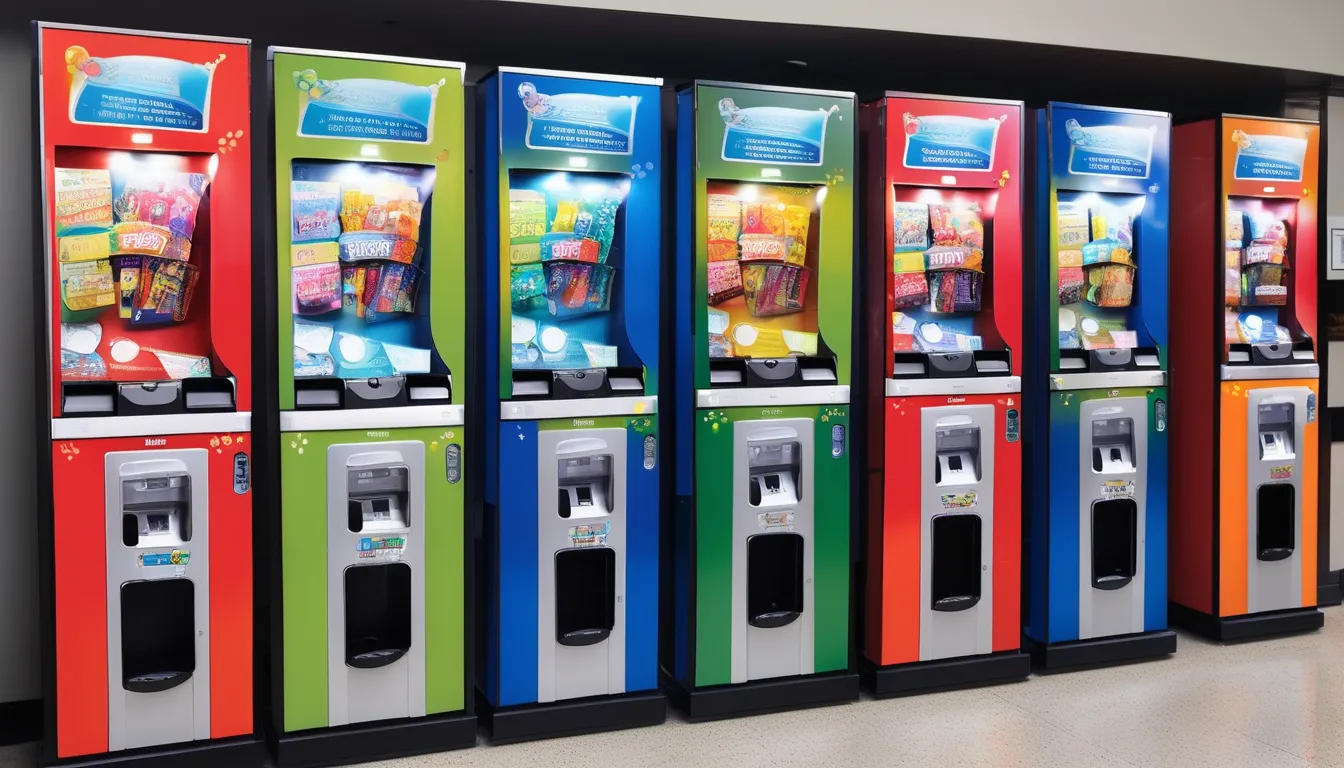Considering the increasing popularity of trading card vending machines, you might be intrigued by the potential tax benefits they offer. These machines can do more than just dispense collectibles; they can also serve as a strategic tax-saving tool for savvy business owners. By exploring the tax deductions, depreciation benefits, and potential tax credits associated with trading card vending machines, you could uncover valuable insights that may positively impact your bottom line.
Tax Deductions for Vending Machine Purchases
When considering tax deductions for vending machine purchases, it's essential to understand the potential savings available to your business. Buying vending machines can qualify as a business expense, allowing you to deduct the cost from your taxable income. This deduction helps in lowering your overall tax liability, providing a tangible benefit to your business finances.
Moreover, expenses related to maintaining and stocking vending machines can also be deducted. This includes costs for purchasing trading cards, restocking supplies, repairs, and even insurance premiums.
By keeping detailed records of these expenses, you ensure that you maximize your deductions and reduce your taxable income.
It's important to consult with a tax professional to ensure that you're taking full advantage of all available deductions related to your vending machines. Proper documentation and adherence to tax regulations are crucial to avoiding any issues during tax audits.
Depreciation Benefits for Business Owners
Benefiting business owners, depreciation offers a valuable tax advantage when it comes to accounting for the wear and tear of assets over time. As a business owner utilizing trading card vending machines, you can benefit from depreciation by spreading out the cost of the machines over their useful life. This means you can deduct a portion of the machine's cost each year as an expense, reducing your taxable income.
By depreciating your vending machines, you're essentially acknowledging that they'll not last forever and that their value decreases over time due to use, obsolescence, or wear and tear.
Depreciation also allows you to recoup the initial investment made in acquiring the vending machines, ultimately lowering your tax liability. This tax advantage can significantly impact your business's financial health by freeing up funds that can be reinvested in the business or used for other purposes.
Properly leveraging depreciation can lead to substantial tax savings, making it a valuable tool for business owners looking to maximize their profits and minimize their tax burden.
Capitalizing on Section 179 Tax Savings
To further optimize your tax-saving strategies as a business owner operating trading card vending machines, it's imperative to explore the benefits of capitalizing on Section 179 tax savings. Section 179 of the IRS tax code allows you to deduct the full purchase price of qualifying equipment purchased or financed during the tax year. By taking advantage of Section 179, you can significantly reduce your taxable income, providing a substantial boost to your cash flow.
|
Benefits of Section 179 Tax Savings |
||
|---|---|---|
|
1. Immediate Deduction of Equipment Costs |
2. Boosts Cash Flow |
3. Encourages Equipment Investment |
Tax Credits for Investing in Vending Machines
Amidst your business ventures, considering the tax benefits associated with investing in vending machines can lead to significant financial advantages.
When you invest in vending machines, you may be eligible for tax credits under the Energy Policy Act of 2005. This act provides a tax credit for the purchase of vending machines that meet specific energy efficiency requirements, encouraging businesses to opt for environmentally friendly options.
The tax credit for vending machines can cover up to 30% of the cost of the equipment, including installation. By taking advantage of this tax credit, you not only reduce your upfront investment but also contribute to a greener environment. It's a win-win situation that benefits both your finances and the planet.
To qualify for the tax credit, ensure that the vending machines you purchase meet the energy efficiency standards set by the U.S. Department of Energy.
Strategies for Maximizing Tax Efficiency
For businesses seeking to optimize their tax efficiency, implementing strategic approaches can yield substantial benefits. One effective strategy is to take advantage of tax deductions by keeping detailed records of all vending machine expenses, including maintenance, restocking, and any other related costs. By tracking these expenses meticulously, you can reduce your taxable income and potentially lower your overall tax liability.
Another key strategy is to consider investing in energy-efficient vending machines. The IRS offers tax incentives for businesses that use energy-efficient equipment, such as vending machines with LED lighting or smart energy-saving features. By choosing environmentally friendly vending machines, you not only contribute to sustainability efforts but also qualify for tax credits that can lead to significant savings.
Additionally, it's crucial to stay informed about any changes in tax laws or regulations that may impact vending machine businesses. By staying up-to-date with tax updates and seeking professional advice when needed, you can ensure that you're maximizing your tax efficiency and taking advantage of all available deductions and credits.
Tips for Reporting Vending Machine Income
When it comes to reporting income from your trading card vending machines, make sure to follow the income reporting guidelines set by the IRS. Utilize tax deduction strategies available to you to maximize your savings and minimize your tax liabilities.
It's essential to maintain accurate records and consult with a tax professional to ensure compliance with all regulations.
Income Reporting Guidelines
Navigating income reporting guidelines for vending machine earnings is crucial for ensuring compliance with tax regulations. When it comes to reporting your vending machine income, accuracy and attention to detail are key. Here are some tips to help you navigate income reporting guidelines effectively:
- Keep detailed records of all transactions to ensure accurate reporting.
- Separate personal and business expenses to avoid any confusion during tax reporting.
- Regularly reconcile your earnings with your records to identify any discrepancies promptly.
- Consult with a tax professional if you're unsure about any aspect of reporting your vending machine income.
Following these guidelines won't only help you stay organized throughout the year but also ensure that you're accurately reporting your vending machine earnings, thus avoiding any potential issues with tax authorities.
デジタル自販機 節税 Deduction Strategies
To maximize your tax savings while reporting vending machine income, implementing smart tax deduction strategies is essential. One effective strategy is to keep meticulous records of all your vending machine-related expenses, such as purchasing inventory, machine maintenance, and any fees associated with operating the machines. These expenses can often be deducted from your vending machine income, lowering your overall taxable income.
Another important tax deduction strategy is to consider depreciation on your vending machines. Generally, vending machines are considered assets that depreciate over time. By calculating and deducting the depreciation expense each year, you can further reduce your taxable income.
Additionally, don't forget to deduct any expenses related to promoting your vending machine business, such as advertising costs or expenses for attending industry conferences. These costs can also be deducted from your vending machine income, providing you with additional tax savings.
Frequently Asked Questions
Can Vending Machine Purchases Be Used to Offset Other Business Expenses?
Yes, vending machine purchases can be used to offset other business expenses. Keep detailed records and consult with your accountant to ensure proper documentation and compliance with tax regulations. Offset wisely for maximum benefits.
How Do Vending Machine Depreciation Benefits Compare to Other Assets?
When considering vending machine depreciation benefits versus other assets, remember to weigh the potential tax savings. Evaluate each asset's depreciation rate and projected utility to make informed decisions on maximizing deductions for your business expenses.
Are There Limitations on the Types of Vending Machines Eligible for Section 179?
Yes, there are limitations on the types of vending machines eligible for section 179. Make sure to check the specific guidelines and requirements for each type of vending machine before claiming any tax benefits.
Do Tax Credits for Investing in Vending Machines Vary by Location?
Tax credits for investing in vending machines can vary by location. Check with your local tax authority for specific details. It's essential to understand the tax implications before making any investment decisions to maximize potential savings.
How Can Business Owners Ensure Accurate Reporting of Vending Machine Income?
To ensure accurate reporting of vending machine income, you should keep detailed records of sales, perform regular audits, and utilize modern payment systems for transparency. Compliance with tax regulations is vital for financial stability.
Conclusion
In conclusion, trading card vending machines can offer significant tax savings for business owners. By taking advantage of deductions, depreciation benefits, tax credits, and Section 179 tax savings, you can maximize your tax efficiency and reduce your taxable income. Remember to keep detailed records, report vending machine income accurately, and consult with a tax professional to ensure you are fully utilizing these tax-saving opportunities. Invest wisely and watch your tax savings grow with trading card vending machines.


